


The article highlights essential treatment options for heart blockage in seniors, focusing on ten key approaches that encompass both advanced medical procedures and lifestyle modifications. It gently emphasizes the importance of personalized care, such as minimally invasive procedures and tailored medication regimens, which not only enhance recovery but also significantly improve the quality of life for older adults facing heart health challenges.
In addition to this, understanding the unique concerns of seniors is paramount. Many may feel anxious or hesitant about their health; thus, it is crucial to reassure them that support is available. By exploring these treatment options, we can foster hope and encourage proactive steps towards better heart health.
Furthermore, the article encourages seniors to consider these approaches as part of a comprehensive care plan. Each option is designed not just to treat the condition, but to nurture overall well-being, ensuring that every individual feels valued and understood in their journey towards recovery.
Heart health is a crucial concern for seniors, often accompanied by the daunting challenge of heart blockage. It’s essential to understand the various treatment options available, as this knowledge can empower older adults to take charge of their cardiovascular well-being. In this article, we will explore ten essential heart blockage treatment strategies, ranging from advanced minimally invasive procedures to lifestyle modifications and innovative therapies. With so many choices, how can seniors navigate this complex landscape to find the most effective solutions tailored to their unique health needs? Rest assured, you are not alone in this journey; support and guidance are available to help you make informed decisions.
At Amavita Heart and Vascular Health, we understand that concerns about heart health can be overwhelming, especially for our senior patients. That’s why we offer a comprehensive array of advanced heart blockage treatment options, prominently featuring minimally invasive procedures like cardiac catheterization and heart valve repair. These innovative techniques are specifically designed to enhance blood flow while significantly reducing recovery times. This is particularly beneficial for seniors who may face additional health challenges.
For instance, individuals undergoing cardiac catheterization often enjoy shorter hospital stays and a quicker return to their normal activities, typically within just one to two weeks. This is in stark contrast to the longer recovery associated with traditional open-heart surgery, allowing our patients to regain their independence sooner.
The success rates of these minimally invasive procedures are truly remarkable. Studies show that they not only reduce the risk of complications but also enhance overall satisfaction among patients. At Amavita, our dedication to innovative research further enriches our offerings, providing access to cutting-edge clinical trials that explore new treatment pathways, such as heart blockage treatment, for complex cardiovascular conditions. This commitment ensures that elderly patients receive the most effective and compassionate treatment options available.
We want you to feel confident and supported in your healthcare journey. If you have any questions or would like to learn more about how we can help you, please don’t hesitate to reach out. Your heart health is our priority, and we are here to provide the care you deserve.

Elders can take meaningful steps to pursue heart blockage treatment in their cardiovascular system by making strategic lifestyle changes. With the support of advanced programs like Amavita's CardioElite™, a heart-healthy diet becomes essential. This diet emphasizes the intake of fruits, vegetables, whole grains, and lean proteins while minimizing sodium and saturated fats. For instance, adopting the Mediterranean Diet, which focuses on plant-based foods and lean proteins, can significantly enhance cardiovascular health by promoting nutrient-rich choices.
In addition to dietary changes, regular physical activity is crucial. Seniors should aim for at least 150 minutes of moderate exercise each week, such as walking or swimming, to help lower blood pressure and improve circulation. Furthermore, quitting smoking is vital, as it is linked to a considerable reduction in disease risk. Managing stress through mindfulness practices or relaxation techniques is equally important, as chronic stress can lead to unhealthy habits and increase the risk of cardiovascular disease.
Moreover, ensuring sufficient sleep—targeting 7 to 9 hours each night—can also support cardiovascular well-being. These lifestyle modifications not only enhance heart function but also serve as an important aspect of heart blockage treatment, fostering a healthier, more active life for older adults. With the assistance of Amavita's CardioElite™ program, which integrates AI technology, AHA certification, and provides real-time diagnostic information along with continuous cardiology consultation, older adults can further improve their cardiac condition and reduce the likelihood of readmissions.
Internal medicine physicians view CardioElite™ as a clinical force multiplier, enhancing proactive management of individuals and addressing gaps in cardiac care. Remember, you are not alone on this journey; support is available to help you thrive and maintain your heart health.
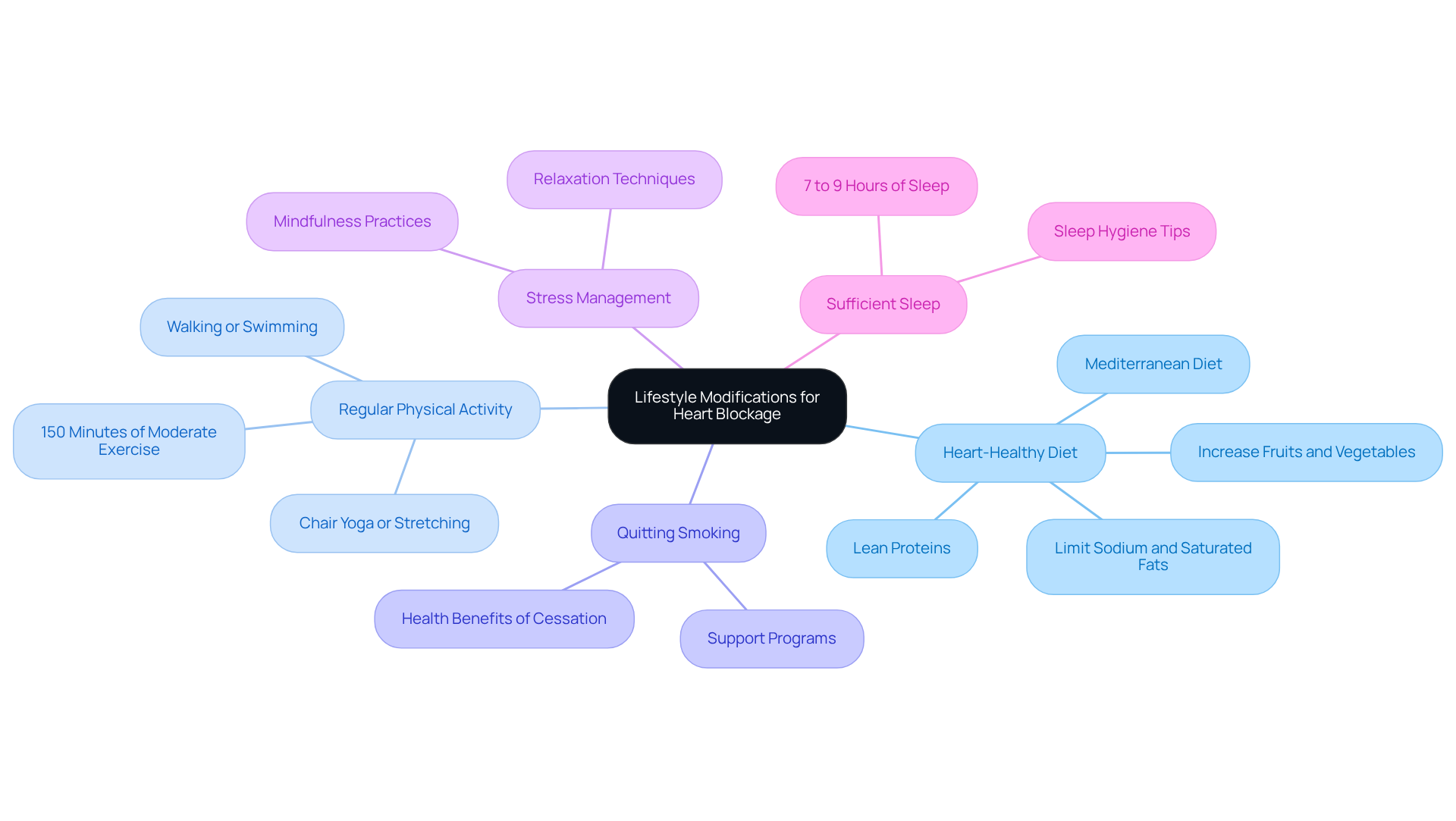
Pharmaceutical options for heart blockage treatment in seniors encompass a range of effective medications tailored to individual health needs. At Amavita Cardiovascular and Vascular Health, we understand that individuals at high risk, including those with diabetes, hypertension, or a family history of cardiac illness, can gain substantial advantages from our focused cardiovascular care.
Research indicates that personalized medication regimens are vital for older adults, as they often have unique health considerations and may be on multiple medications. Our comprehensive cardiac evaluations at Amavita ensure that each individual's specific needs are addressed.
For example, a study entitled "Alternative Therapies for Older Cardiac Individuals" discovered that specific alternative therapies to aspirin might produce improved results for older cardiac individuals, leading to a reassessment of standard treatment protocols. Moreover, the efficacy of statins in older individuals has been extensively recorded, emphasizing their significance in addressing arterial blockage.
Elders are encouraged to work closely with their healthcare professionals to create customized medication plans that consider their particular health profiles and medication interactions. This collaboration ensures optimal management of vascular blockage and provides effective heart blockage treatment for overall cardiovascular well-being.
As Borja Ibáñez, MD, pointed out, "Following a cardiac event, individuals are generally prescribed multiple medications, which can complicate adherence." This highlights the importance of tailored treatment strategies for elderly individuals with cardiovascular issues, a principle that is fundamental to the care offered at Amavita.
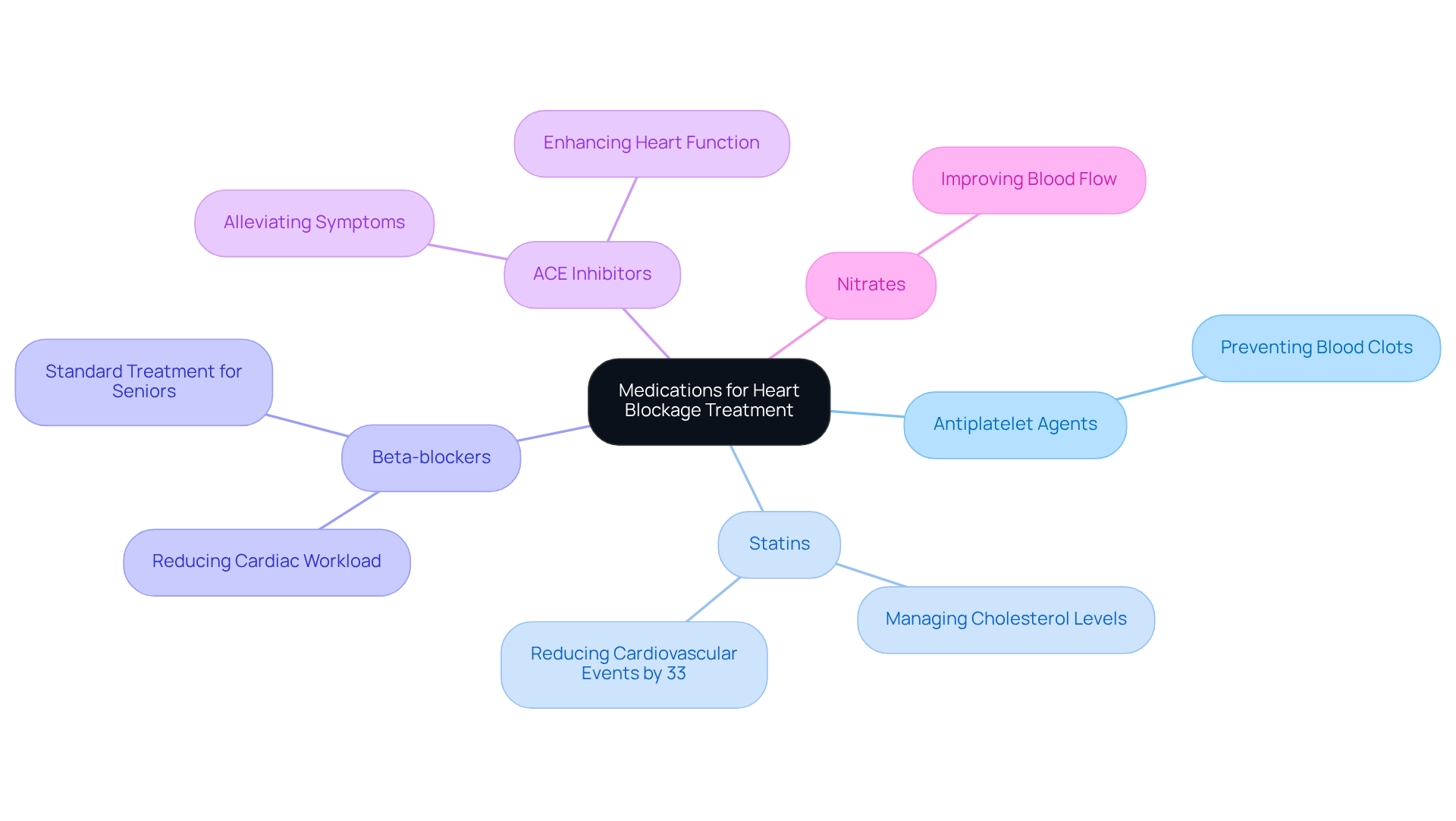
Minimally invasive procedures, such as angioplasty and stenting, provide effective heart blockage treatment solutions, particularly for seniors. These techniques involve the insertion of a catheter into the blocked artery, restoring blood flow with minimal discomfort. Unlike conventional surgeries, individuals often experience considerably less discomfort and shorter hospital stays—averaging four days for those aged 80 and above, compared to three days for younger individuals. This reduction in recovery time is crucial for older adults, who face greater risks with more invasive procedures.
The advantages of angioplasty and stenting as heart blockage treatment extend beyond comfort; they also significantly reduce the risks associated with major surgical interventions. For instance, the mortality rate for individuals aged 80 and older undergoing angioplasty is approximately 3.5 percent, which is significantly lower than the risks associated with traditional surgical options. Additionally, research indicates that stenting as a heart blockage treatment can improve long-term survival rates for individuals with complete blockages, making it a vital alternative for older adults.
Success stories abound, highlighting the effectiveness of these procedures. Many seniors have reported an enhanced quality of life after stenting, with attack rates post-angioplasty at 2.1 percent for those aged 80 and above, in contrast to 4 percent for younger individuals. This underscores the ability of these minimally invasive methods not only to prolong life but also to improve its quality, making them a preferred choice for older adults seeking heart blockage treatment.
Furthermore, advancements such as drug-coated balloons offer an alternative for patients experiencing re-narrowing within a stent, allowing for targeted treatment without adding more metal to the artery. While these procedures are generally safe, it is important to recognize that they carry standard risks associated with angioplasty. Therefore, older adults should consult with their healthcare providers to understand the best options for their individual health needs.
Moreover, integrating Amavita's CardioElite™ program into the care plan can further enhance outcomes for seniors undergoing these procedures. With its focus on comprehensive cardiovascular management, CardioElite™ equips healthcare teams with advanced diagnostic data and 24/7 cardiology consultation, ultimately reducing readmission rates and improving overall cardiac care in skilled nursing facilities.

For patients experiencing severe blockage of the cardiac arteries, heart blockage treatment may include surgical procedures like coronary artery bypass grafting (CABG) that can be essential. This procedure reroutes blood flow around blocked arteries, effectively restoring the heart's blood supply. While surgery carries inherent risks, it can be life-saving for seniors with significant blockages that cannot be addressed through less invasive methods.
A retrospective study from Mayo Clinic indicates that CABG can lead to favorable outcomes and increased long-term survival for individuals over 80, with a median survival time of 7.6 years compared to their counterparts in the general population. However, older individuals face unique challenges, including slower postoperative recovery and a higher risk of complications such as arrhythmias and infections. Therefore, a thorough evaluation by an experienced cardiology team is crucial to tailor the surgical approach and ensure optimal recovery.
Enhanced perioperative care and contemporary minimally invasive methods have greatly improved safety and outcomes, making CABG a feasible choice for many older individuals. At Amavita Heart and Vascular Health®, we utilize portable, FDA-cleared AI ultrasound technology for bedside cardiac diagnostics. This innovative approach offers real-time guidance and generates reports on cardiovascular structure and function within minutes, enabling early detection and informed decisions.
Additionally, our AHA certification ensures adherence to high evidence-based care standards, enhancing the quality of cardiovascular care and reducing hospital readmissions. Our thorough cardiac assessment method also incorporates preventive cardiology tactics, addressing attack risk for individuals with risk factors through tailored interventions. We are here to support you every step of the way.
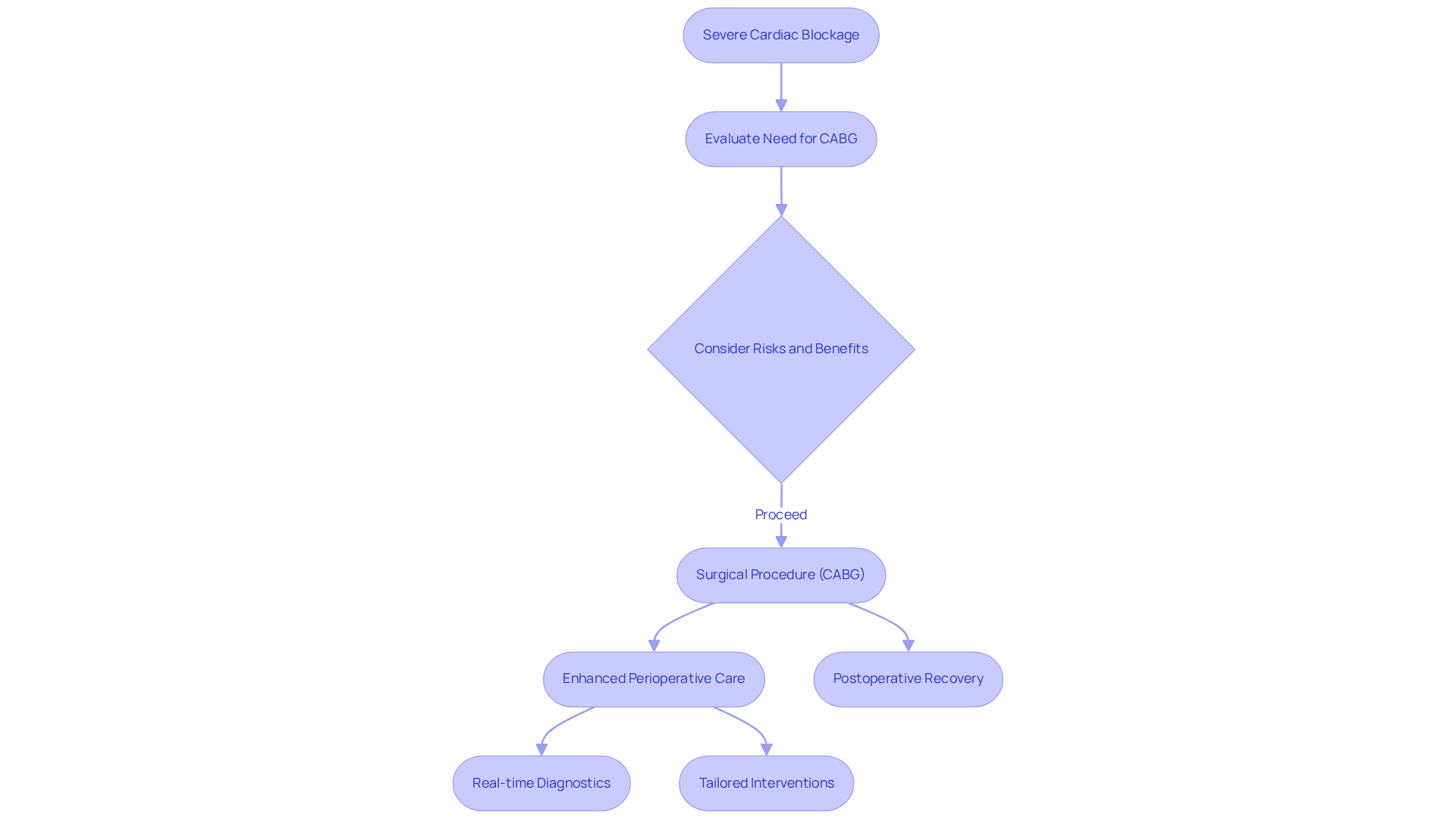
At Amavita Heart and Vascular Health®, our cardiac rehabilitation programs are thoughtfully designed to support your recovery after heart blockage treatment. We understand how daunting this journey can be, and our commitment to innovative and compassionate cardiovascular care is at the heart of what we do. These programs encompass supervised exercise, education on heart-healthy living, and counseling focused on your emotional well-being.
Research shows that elderly participants in cardiac rehab experience remarkable improvements in both physical function and quality of life. For instance, studies indicate that patients engaged in tailored rehabilitation interventions—like those offered through our CardioElite™ program—experience significant gains in mobility and overall health compared to those who do not participate. This integration of AI and real-time diagnostic data ensures that your rehabilitation is not only effective but also personalized to your needs.
Furthermore, participating in cardiac rehabilitation can greatly reduce the likelihood of future cardiac issues that may necessitate heart blockage treatment. Evidence suggests that commitment to these programs leads to fewer hospitalizations and better long-term outcomes. Our cardiac rehab programs are increasingly tailored to meet the unique needs of older adults, emphasizing personalized exercise regimens that enhance strength, balance, and endurance. Key elements of these programs include:
All contributing to a heart-healthy lifestyle.
By engaging in these organized programs, you can ensure a safer and more efficient recovery process. This not only improves your quality of life but also enhances your longevity. We are here to support you every step of the way, providing the nurturing care you deserve as you embark on this important journey toward better health.
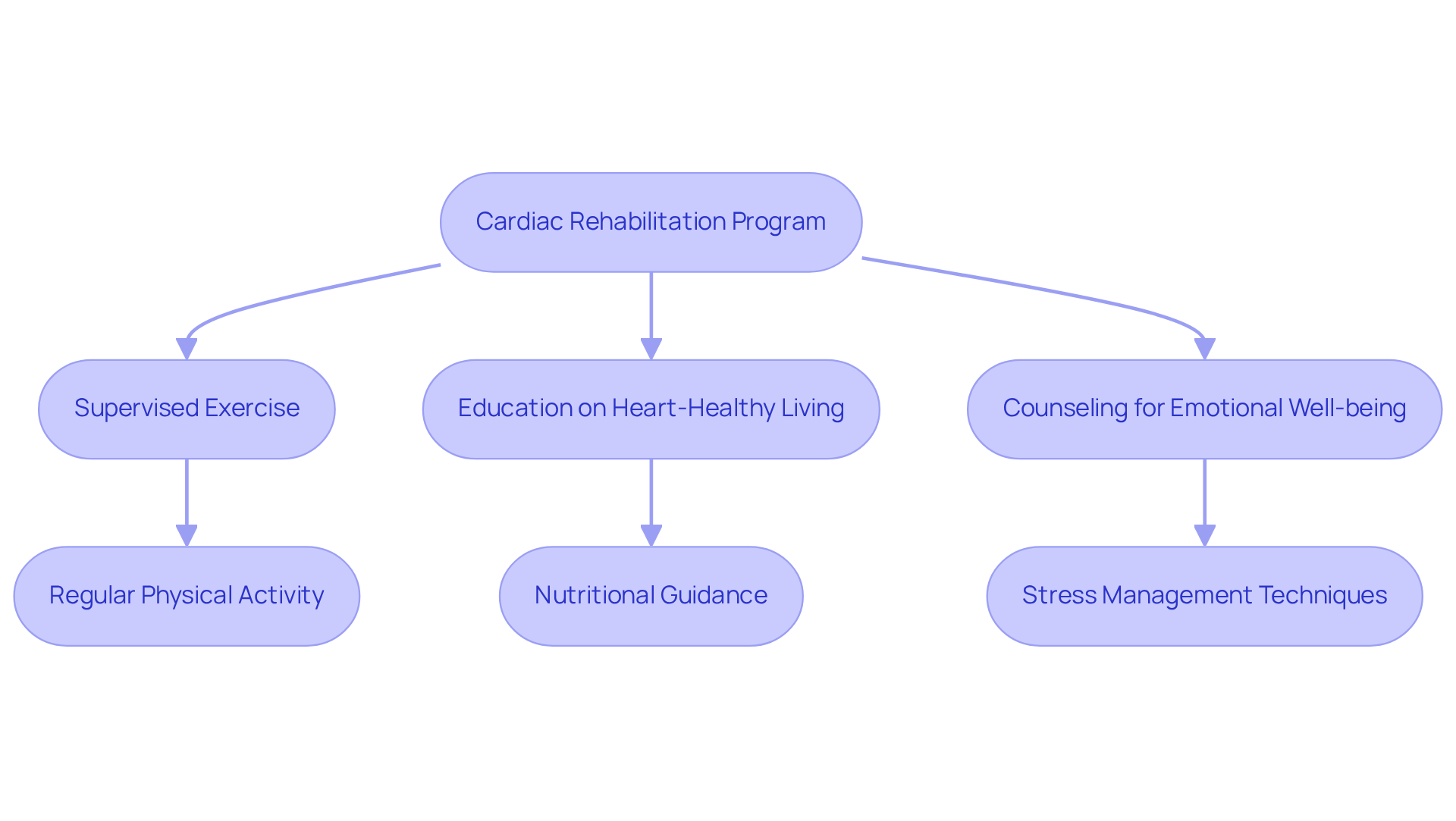
Enhanced External Counter Pulsation (EECP) is a revolutionary, non-invasive treatment designed to improve blood circulation to your heart. Imagine this: cuffs placed on your legs inflate and deflate in sync with your heartbeat, effectively promoting circulation and significantly reducing the frequency of angina episodes. For seniors who may not be eligible for more invasive procedures, EECP offers a safe and effective heart blockage treatment option for managing symptoms of blockage.
Research shows that approximately 85% of individuals undergoing EECP experience a decrease in angina severity. Even more encouraging, 66.4% of these individuals maintain these benefits for over three years. In fact, 61% of patients in Canadian Cardiovascular Society (CCS) class II reported at least one class improvement after treatment. This highlights EECP's efficacy in enhancing the quality of life for elderly patients with heart conditions.
This innovative therapy not only alleviates symptoms but also empowers older adults to lead a more active and fulfilling lifestyle. If you or a loved one are feeling uncertain about heart health, consider exploring EECP as a compassionate option. Your well-being is important, and support is available to help you navigate these challenges.
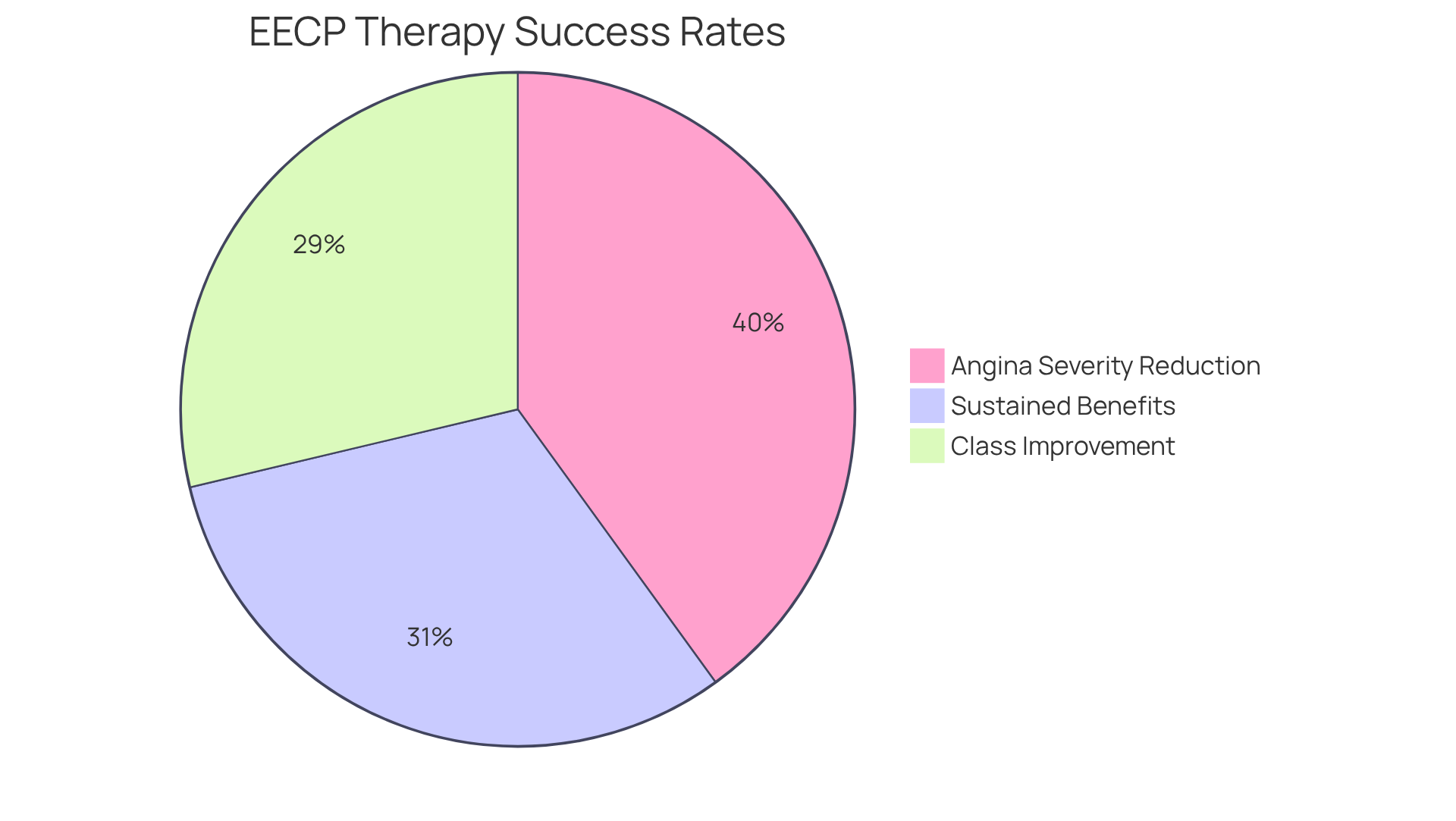
Heart blockage treatment in seniors can address issues arising from various factors, including:
Atherosclerosis, characterized by the buildup of plaque in the arteries, is particularly prevalent among older adults. Research indicates that over 99% of individuals who develop coronary artery disease had at least one nonoptimal risk factor prior to their event. With elevated blood pressure affecting more than 70% of those aged 70 and above, the risk of vascular blockage significantly increases, making regular monitoring essential.
Lifestyle choices play a crucial role in the development of artery blockage. Smoking, poor dietary habits, and a lack of physical activity are major contributors. Alarmingly, around 50% of U.S. adults live with some form of cardiovascular disease, underscoring the urgent need for preventive measures. For seniors, understanding these risk factors is vital for managing existing conditions and implementing effective heart blockage treatment strategies. Regular check-ups and screenings, such as the comprehensive cardiac assessment offered through Amavita's CardioElite™ program, can facilitate early detection and intervention, which is essential for effective heart blockage treatment and ultimately improving cardiovascular health.
Case studies reveal that small lifestyle changes, like increasing physical activity and enhancing nutrition, can significantly improve cardiovascular well-being. Addressing social factors that influence health, such as access to medical services and economic stability, is also essential for promoting cardiovascular health among older adults. By prioritizing these considerations, seniors can take proactive steps to reduce their risk of arterial blockage and enhance their overall health. A practical suggestion is for older adults to schedule regular appointments with their healthcare provider to monitor their cardiovascular health and discuss personalized strategies for risk reduction.
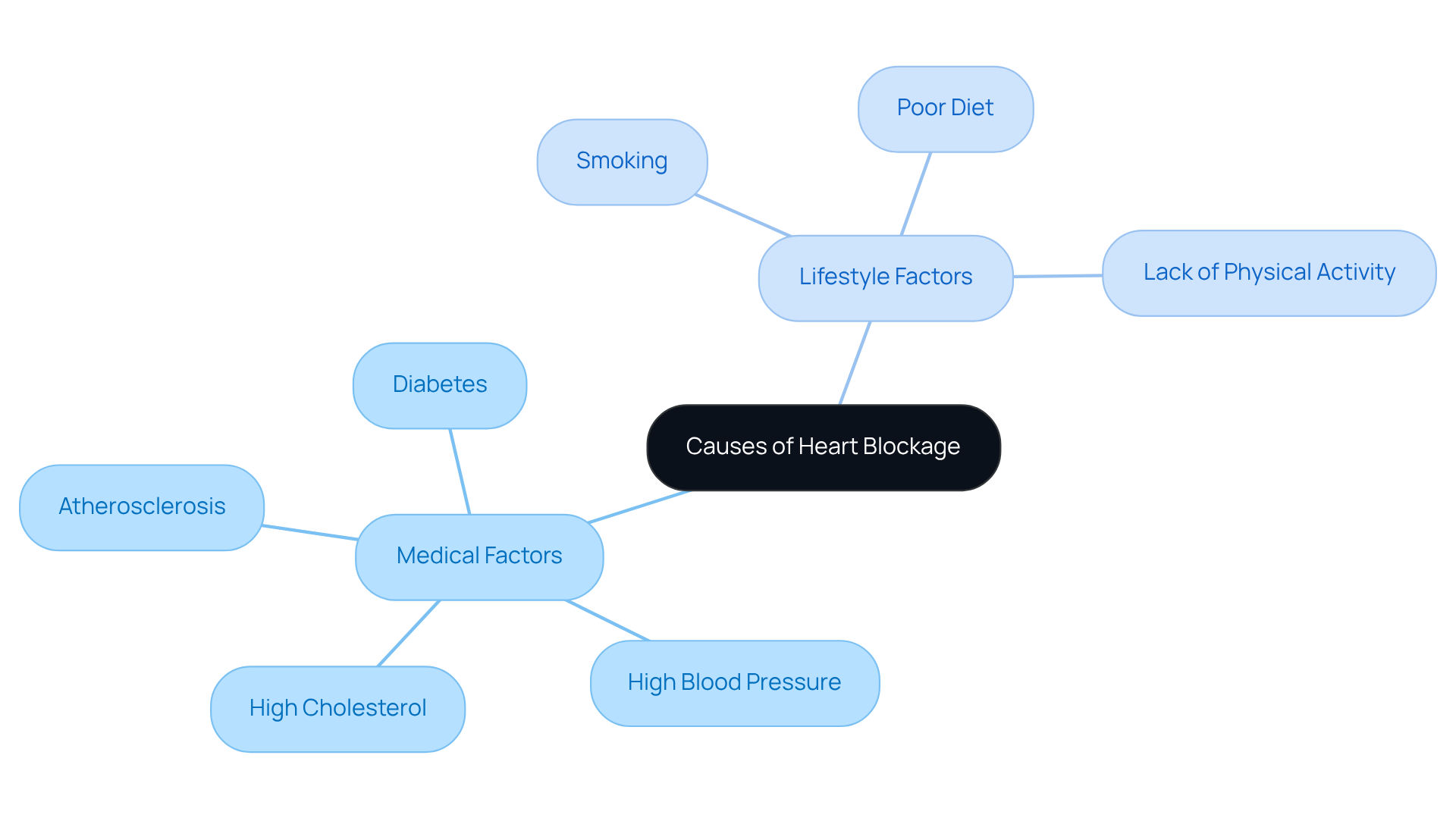
Efficient observation of cardiac blockage is vital, especially for seniors. Various diagnostic examinations, such as electrocardiograms (ECGs), echocardiograms, and stress tests, play a crucial role in evaluating cardiac function, identifying blockages, and determining the most effective heart blockage treatment options. At Amavita Heart and Vascular Health®, we understand your concerns, and our innovative AI-powered diagnostic technology, part of the CardioElite™ program, enhances early detection and results for individuals like you. Frequent monitoring allows healthcare providers to observe changes in cardiovascular health, enabling them to modify heart blockage treatment as needed.
The comprehensive cardiac evaluation process includes advanced risk assessment tools and personalized interventions that are crucial for heart blockage treatment tailored to your unique needs. For instance, echocardiograms utilize portable, FDA-cleared AI ultrasound technology to generate real-time images of your heart, significantly aiding in the early identification of conditions such as valve disease and cardiac failure. Research, including the SCOT-HEART study, suggests that early identification through such tests can lead to better outcomes for older patients in need of heart blockage treatment. The results indicate that those in the CCTA group were 41% less likely to succumb to cardiovascular disease or experience a myocardial infarction compared to standard tests.
Statistics reveal that nearly half of American adults are affected by hypertension, and about 38 percent have high cholesterol. Both conditions can be effectively managed through lifestyle modifications and regular monitoring. Dr. Cross emphasizes the importance of controlling these risk factors for effective heart blockage treatment, stating, "Avoid tobacco and alcohol, and make sure you have good control of other risk factors, like diabetes, high blood pressure, and high cholesterol." The integration of advanced technologies, such as cardiac CT and AI-assisted imaging through our CardioElite™ program, enhances the accuracy of these diagnostic tests, which is vital for effective heart blockage treatment, allowing for a more personalized approach to your cardiovascular management.
Healthcare providers can suggest a customized timetable for these assessments based on your personal risk factors, ensuring that you receive the thorough care necessary to maintain optimal cardiovascular well-being. Remember, you are not alone in this journey; we are here to support you every step of the way.
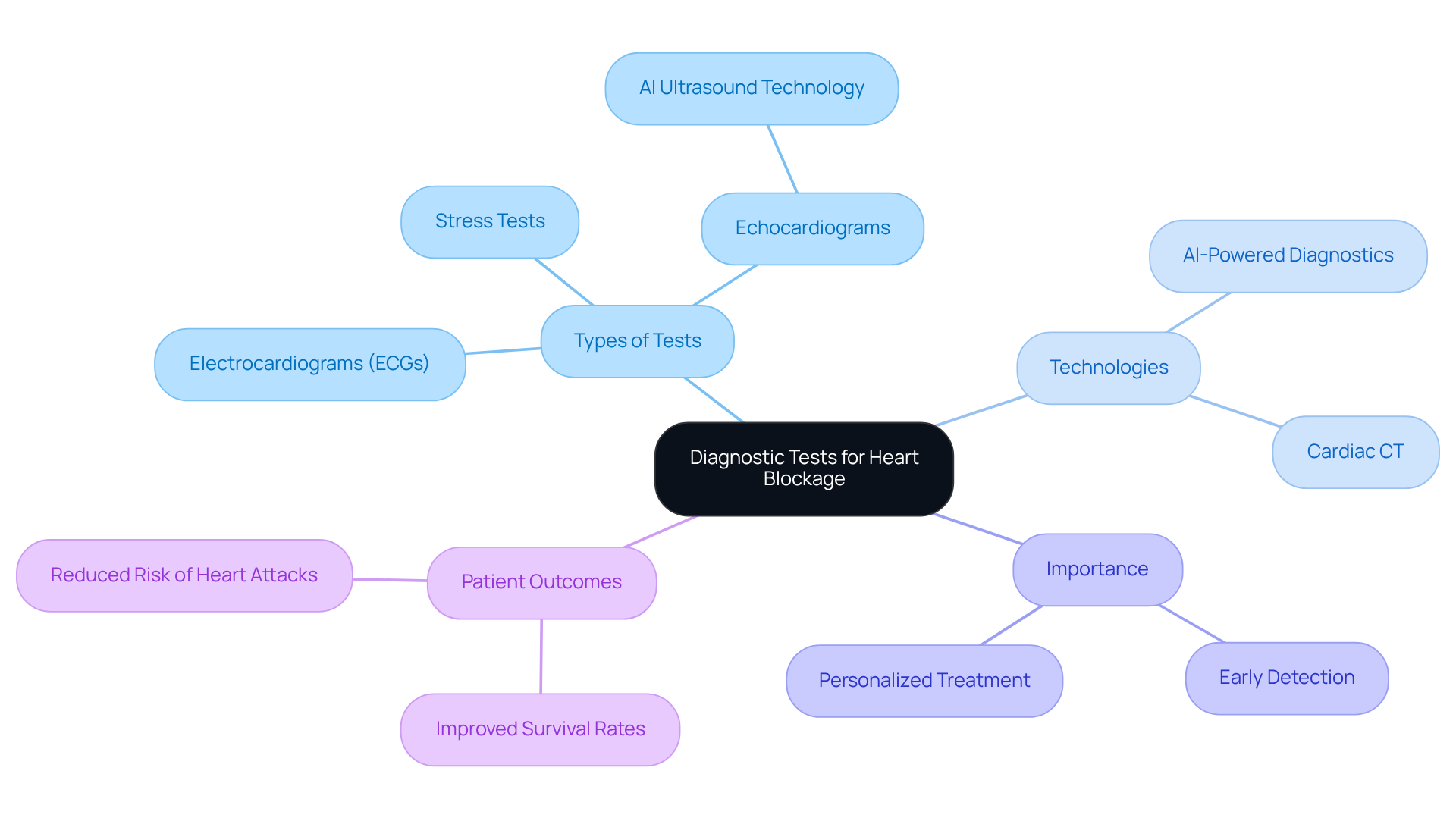
Empowering patients through education is a cornerstone of effective heart blockage treatment management at Amavita Heart and Vascular Health®. It is essential for seniors to be informed about their condition, treatment options, and the importance of lifestyle changes. At Amavita, we provide a range of educational materials, including:
All aimed at improving understanding and promoting proactive wellness management.
As highlighted by Heisinger Bluffs, "When older adults are invited to express their thoughts and feelings regarding their care options, they become more engaged and feel more positive about their care plans." By nurturing a cooperative bond between individuals and their medical teams, older adults can make knowledgeable choices that benefit their cardiovascular well-being. Research shows that including seniors in their care choices greatly affects their well-being and quality of life.
At Amavita, our advanced imaging capabilities and comprehensive evaluations are designed to address the unique needs of high-risk patients, ensuring that they receive the most effective and compassionate care. To further enhance your understanding of heart health, consider attending local workshops or consulting with healthcare providers. Remember, you are not alone on this journey; support is always available.
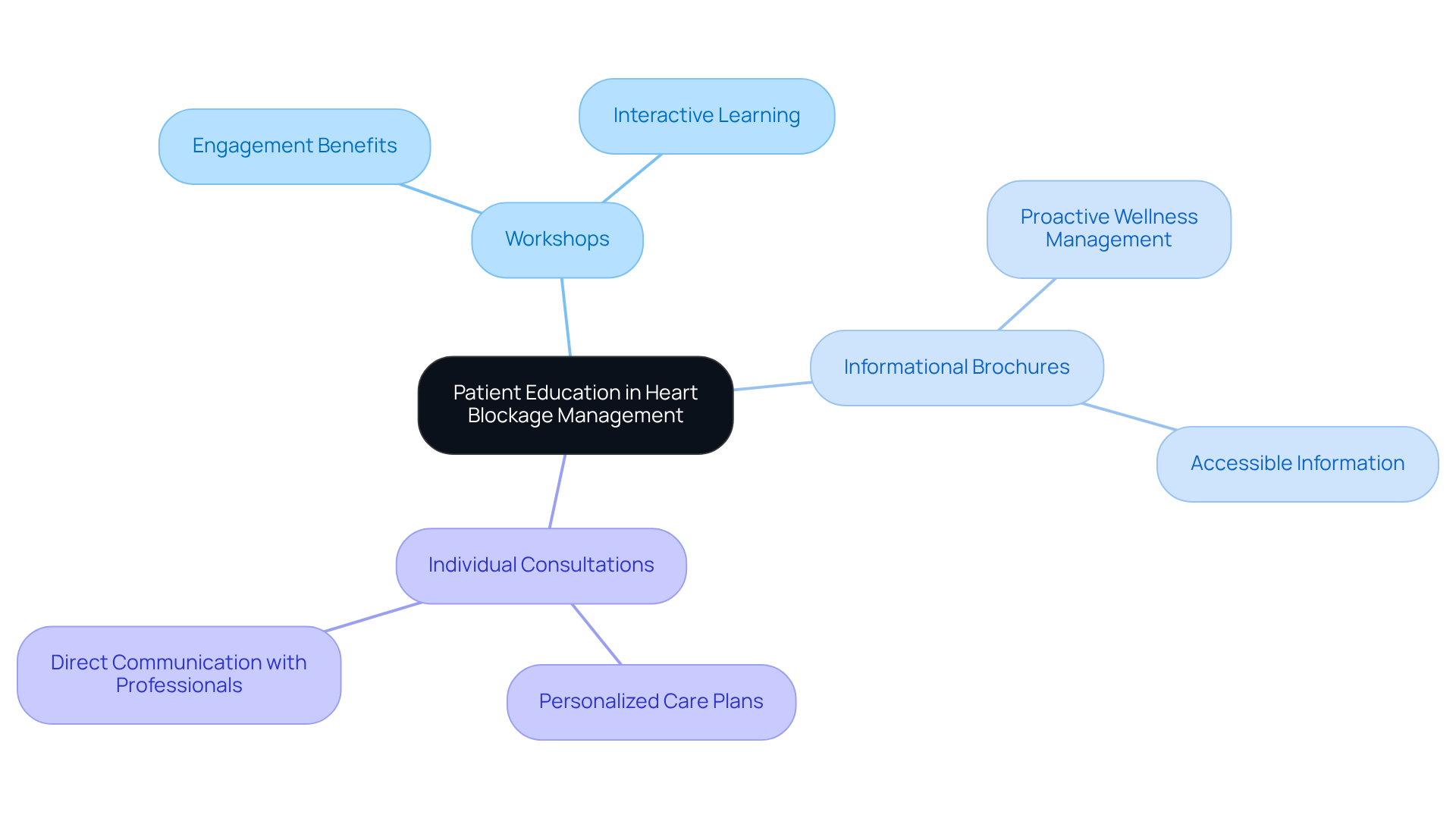
Heart blockage treatment for seniors is a multifaceted approach that encompasses advanced medical interventions, lifestyle modifications, and patient education. This comprehensive strategy prioritizes heart health, allowing older adults facing cardiovascular challenges to regain their independence and improve their overall well-being.
Key insights highlight the importance of lifestyle changes, such as a heart-healthy diet and regular exercise, as essential components in managing heart blockage. In addition to this, medications ranging from antiplatelet agents to statins underscore the necessity of personalized treatment plans tailored to the unique health profiles of elderly patients. Furthermore, advancements in diagnostic technologies and cardiac rehabilitation programs provide crucial support in monitoring and enhancing recovery outcomes.
Understanding the factors that contribute to heart blockage and engaging in proactive management can empower seniors to take charge of their cardiovascular health. By embracing available resources and seeking guidance from healthcare professionals, individuals can navigate their heart health journey with confidence. Ultimately, prioritizing heart health not only fosters a better quality of life but also encourages a community of support and knowledge that benefits all.
What advanced treatment options does Amavita Heart and Vascular Health offer for heart blockage?
Amavita offers a comprehensive array of advanced heart blockage treatment options, including minimally invasive procedures like cardiac catheterization and heart valve repair, designed to enhance blood flow and reduce recovery times.
How do minimally invasive procedures benefit seniors?
Seniors undergoing minimally invasive procedures, such as cardiac catheterization, often experience shorter hospital stays and a quicker return to normal activities, typically within one to two weeks, compared to longer recovery times associated with traditional open-heart surgery.
What are the success rates of minimally invasive heart procedures?
Studies indicate that minimally invasive procedures not only reduce the risk of complications but also enhance overall patient satisfaction.
How does Amavita support innovative research in heart health?
Amavita's dedication to innovative research provides access to cutting-edge clinical trials exploring new treatment pathways for complex cardiovascular conditions, ensuring elderly patients receive effective and compassionate care.
What lifestyle modifications can seniors make to manage heart blockage?
Seniors can pursue heart blockage treatment by adopting a heart-healthy diet, engaging in regular physical activity, quitting smoking, managing stress, and ensuring sufficient sleep.
What dietary changes are recommended for heart health?
A heart-healthy diet emphasizes fruits, vegetables, whole grains, and lean proteins while minimizing sodium and saturated fats. The Mediterranean Diet is highlighted for its focus on plant-based foods and lean proteins.
How much physical activity should seniors aim for each week?
Seniors should aim for at least 150 minutes of moderate exercise each week, such as walking or swimming, to help lower blood pressure and improve circulation.
What pharmaceutical options are available for heart blockage treatment in seniors?
Pharmaceutical options include antiplatelet agents (like aspirin), statins, beta-blockers, ACE inhibitors, and nitrates, tailored to individual health needs.
Why is personalized medication management important for older adults?
Personalized medication regimens are vital for older adults due to unique health considerations and the likelihood of being on multiple medications, which can complicate adherence.
How can seniors create customized medication plans?
Seniors are encouraged to work closely with their healthcare professionals to develop medication plans that consider their specific health profiles and potential medication interactions for optimal management of vascular blockage.